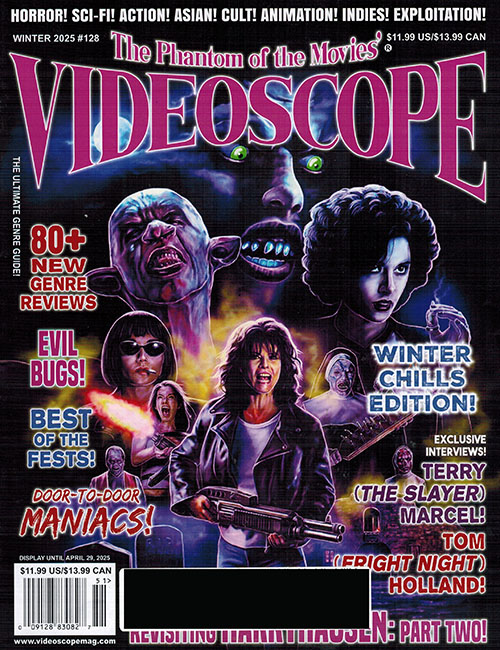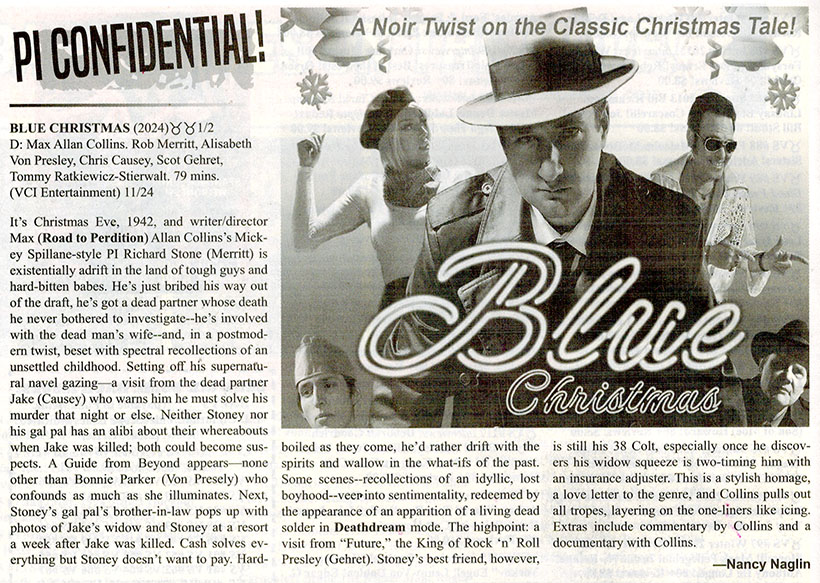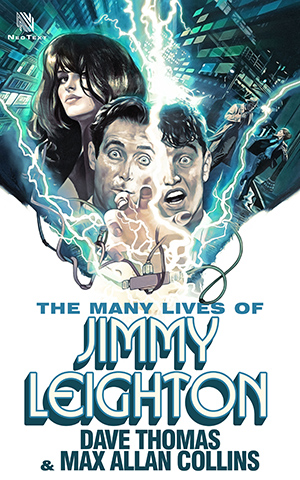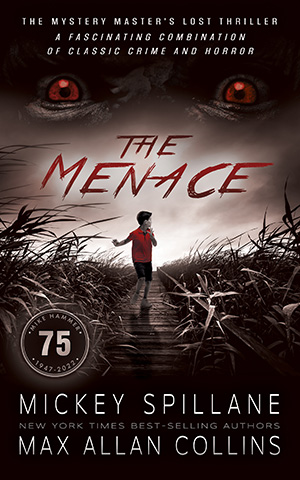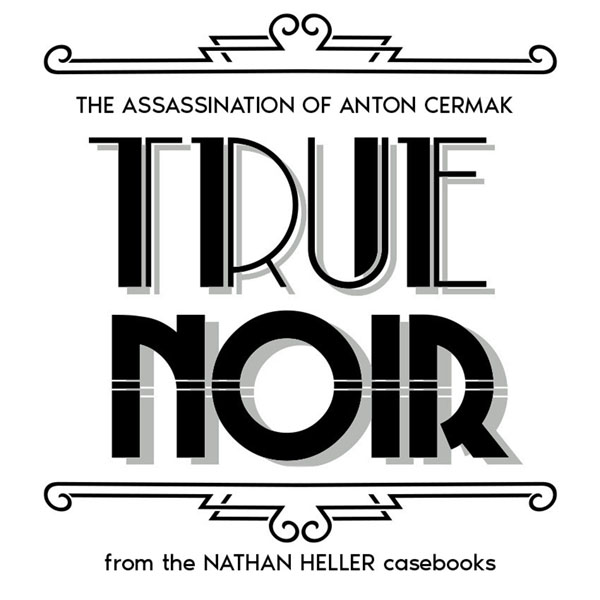Once upon a time, Kirkus Reviews gave my work some of the worst notices I ever received anywhere; they were downright mean. It’s even rumored that the despicable murder victim, Kirk S. Rath, in my Mallory novel Nice Weekend for a Murder, was named in their “honor.” No doubt I’ll get another bad review from them, before I leave the planet. But you know what?
They love Barbara Allan. Shhhhh! Don’t ever tell them I am half of that team, though undoubtedly my wife Barb deserves the lioness’ share of the credit.
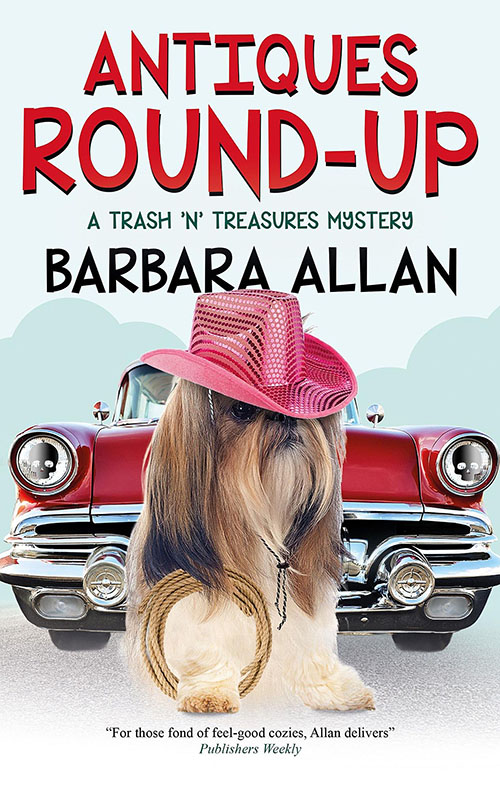
Here’s the lovely Kirkus review of the forthcoming Antiques Round-Up.
Severn House Pages: 208 Price (Hardcover): $29.99 Publication Date: October 7, 2025
Mother and daughter antique dealers take a trip to Texas, where all hell breaks loose.
Vivian Borne is a bipolar woman of many talents. Her daughter, Brandy Borne, is a divorced mother who takes antidepressants and dotes on her diabetic shih tzu, Sushi. Their shop sales need a boost, and since they’ve recently done well with Western antiques, Vivian’s motivated by an ad for a citywide yard sale to head to Tranquility, Texas, where she thinks they can score some bargains. Brandy’s fiancé, Tony Cassato — the police chief in their hometown of Serenity, Iowa — has a history with the daring duo that gives him little hope they’ll stay out of trouble. From the start, the trip doesn’t go well. They get a flat tire, they get lost, they get stuck in a ditch, they get stuck sleeping in a very odd motel. Awakened by the police, they’re arrested for damaging a replica of Cherokee life in the 1800s.
Tony gets them out of jail, but their arrival in Texas is marked by even worse trouble. Vivian, looking to get ahead of the competition, rents a horse and visits several sellers she’d talked with about purchasing certain items before the sale starts. Her first two meetings go well, but her third meeting with a Mr. Tool is cut short when she turns up his body, shot in the head. Since she’s already paid for a necklace, she searches for it and finds it just as the police arrive. With a long string of solving mysteries to their credit, the pair must solve this one to stay out of jail.
A rollicking story of crime fighting includes plenty of antique-buying tips and some Texas-style recipes.
I am pleased to say we have received many good reviews over the years for our Antiques/Trash ’n’ Treasures series, and not just from Kirkus. It’s gratifying, but we are pretty sure this is the first time a reviewer has started out by observing that “all hell breaks loose.”
Right now Barb is working on her draft of the next book in the series (which she always begins by telling me this will be the last one – we’re up to 20, I think). She is diligent and painstaking about the process in a way I admire very much.
There is nothing in my writing life more pleasurable than working on my draft from Barb’s first draft. Actually, what Barb hands off to me is not really a first draft, because it’s polished as “all hell,” to invoke Kirkus. How our collaboration works is this: we agree on a basic plot, very basic, the idea always coming from Barb, who says she needs a personal connection to the material. She writes a draft shorter than what we’ve been contracted to deliver. Let’s say (although this varies) she gives me 250 pages that I need to expand to 300 pages.
What do I do? I add even more humor (there’s always plenty), write action scenes she has skipped (leaving me a note to “take it away”), expand dialogue scenes when her short story roots start to show, and suss out any plot holes, of which there are few if any. Barb is very good about letting me do as I wish, as long as I don’t trip over the plot. That’s a possibility because I do not read her draft before I begin mine, which is a revision and expansion of hers, working directly in her draft. So the in’s and out’s of the mystery are often news to me when I reach them. If she can surprise me, she’ll surprise you.
I ask her how she can work so hard on something – a minimum of six months – and then hand it over to me, saying only, “Do whatever you want. I’m sick of it.”
She’s as good as her word.
I would say she is Brandy, more than she’s Vivian; and I am more Vivian than she is Brandy.
If you’re a fan of mine, and have avoided these novels because they are sold as cozy mysteries (which they are, but subversively so, a fact an Ellery Queen Mystery Magazine reviewer once pointed out), you should try one. You can always slip the inevitable cute dog cover off and only return it when you’ve completed reading it and shelving it spine out.
Confession: we love the cute dog covers.
There is further good Brandy and her mother news, by the way. Our Antiques indie film, Death by Fruitcake, has been chosen to be an official selection of another film festival – the Iowa Independent Film Festival. Keep in mind we only entered seven festivals and have been official selections of three. (Two festivals haven’t announced yet.)
What’s significant is the rule-of-thumb is…you are lucky to become an official selection of one festival out of ten that you enter. So we’re already ahead of the curve. We have limited ourselves to only Iowa fests, with the exception of the New Jersey Mystery, Crime & Horror Film Festival, which seemed right up our alley. Tough competition there (but, really, everywhere).
We are also looking seriously at three avenues of distribution, and should have an announcement soon.
Here is the official press release about the upcoming Star City Festival and my being honored there. It does not include that our film Death by Fruitcake will be screened on Saturday, August 2, at 6 pm with Q and A after.
News provided by
EIN Presswire
Jul 10, 2025, 10:05 AM ET
WAUKON, IA, UNITED STATES, July 10, 2025. The Star City Film Festival Returns to Waukon, Iowa for Its 8th Season
Celebrating Film, Creativity, and Community – July 31 to August 3, 2024. Special Guest of Honor Max Allan Collins.
The Star City Film Festival is thrilled to announce its return for the 8th season, taking place from July 31 to August 3, 2024, in the charming town of Waukon, Iowa. Founded and directed by the talented Dr. Katie O’Regan, this year’s festival promises to be an unforgettable celebration of filmmaking, featuring 40 diverse films, live performances of three new film scripts as radio plays, a glamorous red carpet premiere, and engaging talk-backs with attending filmmakers.
This year’s festival will honor Iowa’s very own Max Allan Collins, a celebrated figure in the world of film noir and a best-selling author, producer, and director. Max is renowned for his work on the Academy Award-winning film adaptation of his graphic novel, “Road to Perdition.” He has been recognized by the Mystery Writers of America as a Grand Master and has received an impressive twenty-three “Shamus” nominations from the Private Eye Writers of America, with notable wins for his Nathan Heller thrillers.
Max’s extensive body of work includes not only his acclaimed novels but also contributions to comics, film criticism, and several successful screenplays, including the Lifetime film “Mommy” and the HBO World Premiere “The Expert.” His creativity also extends to the world of documentaries, with “Mike Hammer’s Mickey Spillane” featured in the Criterion Collection.
Joining Max at this year’s festival is his wife, Barbara Collins, an esteemed short story writer and production manager for various independent film projects. Together, they have co-authored bestselling novels that showcase their unique storytelling abilities.
The Star City Film Festival aims to create a platform for filmmakers and audiences alike to connect, inspire, and celebrate the art of cinema. Attendees can look forward to a lineup of films that highlight emerging talent, as well as discussions that delve into the creative process behind the stories told on screen.
Join us in Waukon for a celebration of film, creativity, and community for all the activities including a live street dance and outdoor music with “Corn Days” happening at the same time!
For more information about the festival, ticketing, and programming details, please visit www.sacrednoisesociety.org
Dr. Katie O’Regan interviewed me, and I think it’s one of the better ones I’ve given in a while.
Here is an expanded version of my San Diego Comic-Con appearances, now including signings.
San Diego Comic-con 2025 Schedule
Thursday, July 24:
11am panel “Leave Them in Suspense” 23ABC (Mysterious Galaxy)
12:30pm signing AA09
Friday, July 25:
4pm “Spotlight on MAC” 28DE (Robert Meyer Burnett)
5:30pm signing AA23
Saturday, July 26:
10am signing booth 2001 (new Johnny Dynamite book)
Sunday, July 27:
11:00 panel (Titan with Andrew Sumner) 32AB
Apparently because Hard Case Crime has released a new trade paperback of The Last Quarry (previously only available in traditional mass-market paperback), a few reviews for that 2006 novel, which ignited a new run of Quarry novels, have begun to pop up. I’ll be starting the next soon (actually, noodled some on it this morning).
Here’s one of these reviews.
Here’s where you can stream the late great Michael Cornelison in Eliot Ness: An Untouchable Life.
As I’ve been interviewed about returning to indie filmmaking late in life after a twenty year hiatus, it’s occurred to me that this loss of Mike was the reason. Mike was involved in every one of my productions – he acted in Mommy, Mommy’s Day, Real Time: Siege at Lucas Street Market, and Eliot Ness: An Untouchable Life, plus narrated both Mike Hammer’s Mickey Spillane and Caveman: V.T. Hamlin and Alley Oop.
And my impulsive move back to filmmaking was deciding to film our radio-style play, Mickey Spillane’s Encore for Murder. It was originally produced as an audio-only production starring Stacy Keach as Mike Hammer…and Michael Cornelison as Pat Chambers.
Please check back in with me next week before Barb and I leave for the San Diego con on Wednesday. The update after that will likely be photos from the con, particularly of my panels with my pals Rob Burnett and Andrew Sumner.
M.A.C.

